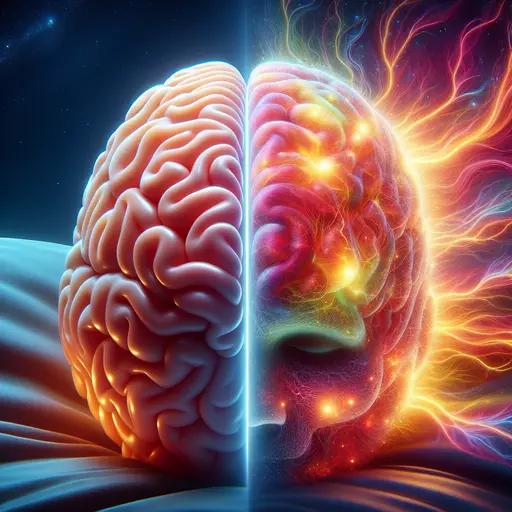Exploring the Connection Between Physical and Mental Health
Explore the intricate connection between physical and mental health, the scientific evidence behind their link, and ways to nurture both for holistic well-being.

Our overall well-being is often perceived as a reflection of our physical health, but what many don't realize is that our mental wellness plays an equally crucial role. The relationship between physical and mental health is profound, complex, and bidirectional - making it essential to understand and nurture both aspects to lead a balanced and fulfilling life.
The Intricate Connection Between Physical and Mental Health
Physical health and mental health are intricately intertwined. This symbiotic relationship between the two is often underestimated, but the reality is that poor physical health can lead to an increased risk of developing mental health problems. This is not a one-way relationship though. Conversely, poor mental health can also have a substantial negative impact on physical health.
This might result in an increase in susceptibility to certain conditions, or exacerbate existing ones. The importance of maintaining both good physical and mental health cannot be overstated. By understanding and acknowledging the complex interplay between our mental and physical health, we can aim for a more holistic approach to wellness that will benefit us in the long run.
Scientific Evidence Linking Physical and Mental Health
Scientific research strongly supports the often-intuited connection between physical and mental health. According to the globally recognized entity, the World Health Organization (WHO), 'Health is a state of complete physical, mental, and social well-being and not merely the absence of disease or infirmity'. This holistic definition underscores and illuminates the profound interdependence of physical and mental health.
Multiple studies have shown that physical well-being significantly influences one's mental state. For instance, regular physical activity has been found to reduce anxiety and depression while improving mood and overall mental health. Similarly, a healthy diet not only keeps the body functioning optimally, but also has a direct impact on the brain, influencing cognition, mood, and mental health.
On the flip side, mental health also has a profound effect on physical health. Chronic stress or depression can lead to serious physical health problems, such as heart disease. There is a complex, bidirectional interaction between mental and physical health, each influencing and being influenced by the other. This symbiotic relationship reinforces the importance of a holistic approach to health and wellness.
The Impact of Physical Health on Mental Well-being
Chronic conditions such as diabetes, heart disease, or cancer can have an exceptionally profound impact on a person's mental health. When an individual is tasked with dealing with such a burdensome disease, they may find themselves confronted with various mental health challenges, including but not limited to depression or anxiety. The relentless strain of dealing with a chronic illness can often lead to social isolation as individuals may find it increasingly difficult to maintain the same level of social interaction as they once had.
This social isolation can, in turn, exacerbate feelings of depression and anxiety, creating a vicious cycle that can be difficult to break free from. The physical struggle of dealing with a chronic condition, coupled with the emotional turmoil it causes, can truly test a person's mental resilience. It's a complex interplay between physical health and mental well-being that often gets overlooked in traditional medical conversations.
Recognizing the mental health implications of chronic physical illness is a critical component of holistic healthcare. It's important to understand that physical health does not exist in isolation but is intricately connected with our psychological well-being. The comprehensive health care approach should, therefore, incorporate strategies not just for managing physical symptoms, but also for addressing the psychological distress caused by chronic physical conditions.
At the end of the day, health is wealth, and our physical health directly influences our mental well-being. Keeping this in mind can help us approach healthcare from a more comprehensive, patient-centered perspective that addresses both physical symptoms and psychological distress.
The Impact of Mental Health on Physical Well-being
It's well-documented that mental health issues can directly impact physical health, often in significant and profound ways. For instance, depression, a common but serious mental health disorder, can manifest in various physical symptoms. These may include drastic changes in weight, either gain or loss, persistent fatigue that doesn't improve with rest, and a decreased interest in physical activities, which can further exacerbate the situation.
In addition to depression, anxiety disorders can also inflict physical distress. Symptoms of anxiety may span from headaches and stomachaches to more serious conditions such as a racing heart. These, while may seem trivial initially, can gradually evolve into chronic issues if left unattended. Over time, these symptoms can lead to more serious health complications.
Among these complications, heart disease stands as one of the most threatening. The constant state of stress and worry, often synonymous with anxiety, can put a strain on the heart, increasing the risk of heart disease. It's a stark reminder of the intertwined nature of our mental and physical health, and the necessity to maintain a balance between both.
In conclusion, our mental state plays a critical role in our physical health. Ensuring we stay mentally healthy is not just beneficial for our minds but also our overall physical well-being. We must remember that the mind-body connection is not only powerful but integral to leading a healthy life.
Nurturing Both Physical and Mental Health
Recognizing and nurturing the intricate connection between physical and mental health is vitally important for achieving and maintaining overall wellness. This involves implementing a multi-faceted approach that caters to both aspects of health.
First and foremost, taking care of your body serves as the foundation of good health. This can be accomplished by incorporating a well-rounded, nutritious diet into your everyday routine. Consuming a variety of fruits, vegetables, lean proteins, and whole grains not only fuels your body but also supports your mental well-being.
Alongside a healthy diet, regular physical activity is equally crucial. Engaging in exercise, be it a brisk walk, yoga, or more intense workouts, helps reduce stress and anxiety levels, improve mood, and boost self-esteem. Plus, it strengthens your body, improving physical health and resilience.
One must not underestimate the power of quality sleep as well. Getting the recommended seven to nine hours of sleep per night can significantly improve cognitive function, mood, and overall health. It’s a crucial aspect often overlooked, but maintaining a regular sleep schedule can greatly enhance both your physical and mental health.
Similarly, nurturing your mind is an integral part of this wellness journey. This can be achieved by adopting effective stress management techniques, such as meditation or mindful breathing, which can help you navigate through life's challenges more smoothly.
Seeking professional help if needed is another important aspect. Whether it's counseling or therapy, these services can offer support and provide strategies to cope with mental health issues effectively. Remember, asking for help is not a sign of weakness, but strength.
Lastly, maintaining a positive outlook on life plays a crucial role in mental health. Cultivating positive thoughts and habits, practicing gratitude, and staying hopeful can significantly enhance your mental health, leading to improved overall wellness.
Thus, nurturing both your physical and mental health in tandem is key to a balanced, healthy lifestyle. It's a journey, but each step taken towards this goal is a step towards a happier, healthier you.
Physical Activity and Mental Health
Physical activity is not just beneficial for maintaining physical fitness, but it also stands as one of the most effective ways to enhance mental health. The regular practice of physical exercises can have a deeply positive impact on an array of mental health conditions including depression, anxiety, and much more.
Engaging in a regular exercise routine does not only help in combating these mental disorders, but it also relieves stress, which is a common concern in today's fast-paced life. Stress can be detrimental to both physical and mental health, and exercise can be an efficient way to manage this.
Moreover, physical activity is known to improve memory. A sharp memory is crucial for daily life activities, and by incorporating exercise into our lives, we can keep our minds sharp and clear. If you ever struggle with focus or memory, regular physical activity might be the solution you need.
Another significant benefit of exercise is its contribution to better sleep. A good night's sleep is essential for overall well-being, and regular physical workout can help in regulating your sleep cycle. So if you're battling insomnia or poor sleep quality, consider adding an exercise routine to your day.
Exercise also boosts your overall mood. It releases certain chemicals in your brain that makes you feel happier and more relaxed. This can help you feel more positive and handle stress more effectively.
Remember, even a short 5-minute walk or a quick stretch can make a big difference. You don't need to engage in high-intensity workouts to reap these benefits. Find an activity you enjoy and make it a regular part of your routine. Your mind and body will thank you.
Healthy Eating and Mental Health
A balanced and nutritious diet plays an indispensable role in maintaining not just our physical, but also our mental health. Indeed, it has been scientifically proven that certain nutrients, most notably omega-3 fatty acids and B vitamins, are absolutely critical to preserving and optimizing brain health.
Omega-3 fatty acids, found in foods like fatty fish and flaxseeds, have anti-inflammatory properties that can help protect the brain. They are also involved in renewing brain cells and can even delay brain aging.
On the other hand, B vitamins, particularly B-6, B-9, and B-12, can prevent brain shrinkage, improve brain function, and even prevent certain brain disorders. They are commonly found in foods like chickpeas, spinach, and lean meats.
It's clear to see that a diet that is good for your physical health, packed with these beneficial nutrients, is also immensely good for your mental health. Making the right food choices is truly one of the easiest and most effective ways of taking care of your overall wellbeing.
Conclusion
In conclusion, understanding the connection between physical and mental health is crucial for overall well-being. By adopting a balanced lifestyle that caters to both these aspects, we can nurture our body and mind and live a happier, healthier life.
🌿
Category: Health & Wellness
Join the community
Related Articles

Superfoods to the Rescue: Natural Remedies for Stress and Anxiety
Life can be filled with unpredictable twists and turns tha...

The Ultimate Guide to Healthy Eating: A Path to Better Living
Healthy eating is not just a diet; it’s a lifestyle. By ma...

Strategies to Enhance Sleep Duration and Quality
Have you ever found yourself tossing and turning in bed, s...
Latest Articles

What Sleep Deprivation Does to the Brain
Perhaps you've had those days where you've survived on just ...

The Role of Minerals in Rock Formation
Welcome to another enlightening article on HeavenRelax.com, ...

The Importance of Patience in Our Life
In this fast-paced world we live in, patience is often seen ...
Comments
No comments yet. Be the first to comment!